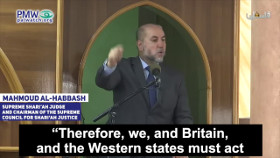Herzl wanted to send Palestinians "to Africa, so wild animals [would] eat them," and Balfour was "an anti-Semite," according to top Palestinian Authority official
- Al-Habbash: “When Herzl came to Palestine, [he said:] ‘We want a land without a people. Therefore, we, and Britain… must act to empty Palestine of its residents… We can take them to Africa… so the wild animals will eat them.’”
- “Foreign people were brought [here] who have no connection to this land. Neither historically nor religiously. They were… planted… like thorns… Balfour did not love the Jews. He was – [like those] called anti-Semites… He… wanted to be rid of the Jews. [Therefore] he issued this [Balfour Declaration].”
In a recent sermon, a top PA religious official demonized two leaders who were instrumental in bringing about the creation of the State of Israel. PA’s Supreme Shari’ah Judge and Chairman of the Supreme Council for Shari'ah Justice, Mahmoud Al-Habbash, who is also a former advisor to PA Chairman Abbas, claimed that in the time before the creation of the State of Israel, then British Foreign Secretary Arthur Balfour was an “anti-Semite,” and then leader of the Zionist movement Theodor Herzl wanted to “empty Palestine” of Palestinians and send them “to Africa, so that the wild animals [would] eat them”:




“When Herzl came to Palestine, he found in it a people, culture, and progress and said: ‘How can the Jews immigrate here? How can the state of the Jews be established here? There is a people here. We want a land without a people. Therefore, we, and Britain, and the Western states must act to empty Palestine of its residents, its people, and throw them into the desert. And we can take them to Africa’ – thus he said – ‘so the wild animals will eat them and we will be rid of the so-called Palestinian people, so that Palestine will become “a land without a people for a people without a land.”’”
[Official PA TV, Nov. 1, 2019]
Al-Habbash denied any presence of Jews in the Land of Israel, stating that Lord Balfour was an “anti-Semite” who wanted to “be rid of the Jews” and therefore brought “foreign people with no connection to the land” and “planted them as thorns” in Palestine. Al-Habbash’s demonization of Herzl and Balfour is part of the PA’s false narrative, which claims that only Palestinians have a history in the Land of Israel, and that the Jews and the British conspired to empty the land of Palestinians to create a homeland for the Jews and a colonial stronghold for the British in the Middle East. To create a rationale for the British support of “Palestine” as a homeland for the Jews, Al-Habbash – and the PA narrative in general – turn Balfour and the British at large into anti-Semites who wanted to get rid of the Jews:


“Tomorrow is the anniversary of the so-called Balfour Promise (i.e., Declaration). The promise given by one who is not the owner to one who has no right to it. Foreign people were brought [here] who have no connection to this land. Neither historically nor religiously. They were brought from all over the world and planted in the heart of this land like thorns, like pikes, on the basis of the so-called ‘Balfour Promise’ that granted a so-called ‘national home for the Jews’ in Palestine… Balfour, did not love the Jews. He was – [one of those who] were called anti-Semites. He was hostile to the Jews… He wanted to create an imperialist situation in the Islamic Arab Eastern region, and wanted to be rid of the Jews. [Therefore] he issued this promise, the cursed promise.”
[Official PA TV, Nov. 1, 2019]
Palestinian Media Watch has documented numerous statements like these by PA leaders who continuously repeat the PA narrative that denies Jewish history in the Land of Israel. Every year, PA leaders curse Balfour and his declaration. Last week, PMW exposed statements by three Palestinian academics who all denied Jewish history in the area.
At the end of the 19th century, the land of Israel was a mostly barren and undeveloped land, largely neglected by the Ottoman Empire. The following are eyewitness accounts of people who visited the area at the time.
In 1867, American author Mark Twain wrote: "Of all the lands there are for dismal scenery, I think Palestine must be the prince… It is a hopeless, dreary, heart-broken land… Palestine sits in sackcloth and ashes. Over it broods the spell of a curse that has withered its fields and fettered its energies… Nazareth is forlorn; about that ford of Jordan where the hosts of Israel entered the Promised Land with songs of rejoicing, one finds only a squalid camp of fantastic Bedouins of the desert; Jericho the accursed, lies a moldering ruin, to-day, even as Joshua's miracle left it more than three thousand years ago… Renowned Jerusalem itself, the stateliest name in history, has lost all its ancient grandeur, and is become a pauper village… Capernaum is a shapeless ruin; Magdala is the home of beggared Arabs; Bethsaida and Chorazin have vanished from the earth… Palestine is desolate and unlovely." [Innocents Abroad, by Mark Twain, 1869]
In 1888, Sir John William Dawson of England wrote: "No national union and no national spirit has prevailed there. The motley impoverished tribes which have occupied it have held it as mere tenants at will, temporary landowners, evidently waiting for those entitled to the permanent possession of the soil." [Sir John William Dawson 1888, cited in Modern Science in Bible Lands, New York 1890, pp. 449-450]
Yussef Ziah el-Khaldi, a mayor of Jerusalem during the Ottoman period, wrote to then Chief Rabbi of France Zadok Kahn saying that while he recognized the Jews' historical claims to the land of Israel, "it is inhabited by people other than Israelites." The letter was passed to Zionist leader Theodor Herzl, who responded that the Jews "are a peace-loving people, happy to be left in peace," and added: "You see another difficulty in the existence of a non-Jewish population in Palestine. But who would want to expel them? Their well-being and individual prosperity will increase as we bring in our own." [Zionism at 100: The Myth of Palestine as "A Land Without People", Washington report on Middle East Affairs, March 1998]


